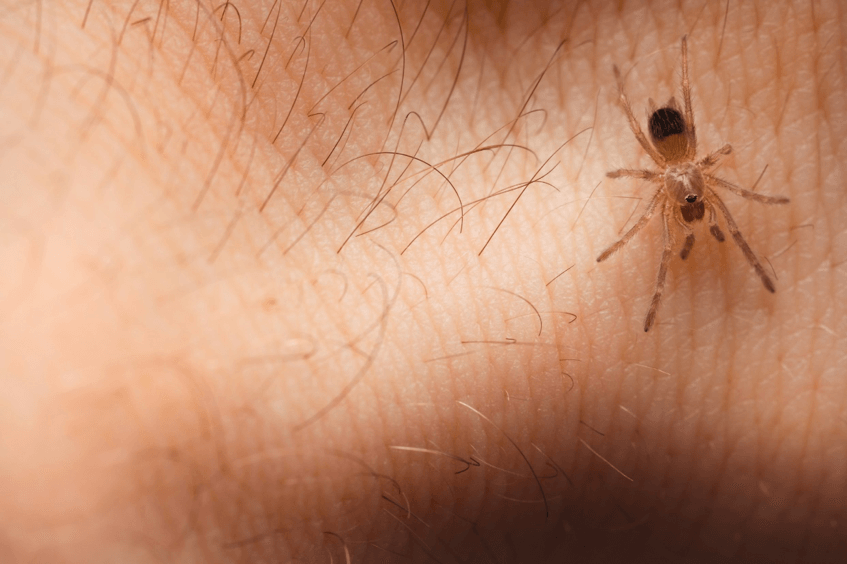Table Of Content
The two most common spider bites are from house spiders, specifically the jumping spider and wolf spider. Occasionally, a spider bite may cause an allergic reaction. Bites from black widows and brown recluse spiders are dangerous because they are poisonous. The first signs of a black widow spider bite are usually a pinprick sensation, minor swelling, redness and a target-shaped sore, Medline Plus explains. Within 15 minutes to an hour, people may start to experience dull pain in a large area of their body, which may be in a different place depending on where they were bitten. Black widow and brown recluse spider bites can be especially dangerous to children because of their smaller body sizes.
Medical Treatment
Additionally, if you have pain and swelling you can take an over-the-counter nonsteroidal anti-inflammatory drug (NSAID), such as Advil (ibuprofen). Consider a tetanus shot or boosterIf a bite is serious or resembles a puncture wound, you might have to talk to your doctor about getting a tetanus shot or booster. “You want to stay up to date with your tetanus shots and get a tetanus booster every 10 years,” Dr. Bazzoli advises.
Identifying Common Spider Bites
“Biting is a last-ditch defensive response if a spider is being squashed,” he says. This can happen when someone rolls over in bed on top of a spider — or sits down on one, he says. “I’ve transferred spiders hundreds of times, and they’ll be running all over my arm and have no interest in biting,” he adds. If you've been bitten by a spider that you suspect is dangerous, call your primary care doctor or go to an urgent care center. If your doctor has online services, an option may be to email a photo of the spider to your doctor.
What to expect from your doctor
Some harvestmen species have brown bodies with a mottled pattern on their backs. The American house spider is common in homes from Florida in the south to the northeastern and northwestern United States. When possible, Crumbley advocates for catching spiders and releasing them back outdoors. Treat these at home by washing the site with soap and water, using cold compresses, and taking an ibuprofen to reduce pain and swelling, he adds. Chances are, you would rather avoid a spider bite altogether than have to treat one.
Black widow spider
Small blisters on their own, with no other symptoms, don't necessarily need special care. But if a blister opens, it becomes at risk for infection, says Dr. Arnold, so don't try to pop them! If you think you may have an infection at the bite site, whether from cellulitis or open blisters, it's best to have your doctor take a look.
Man almost loses his hand after being bitten by spider in his home - Metro.co.uk
Man almost loses his hand after being bitten by spider in his home.
Posted: Mon, 25 Mar 2024 07:00:00 GMT [source]
Before you try to treat spider bites yourself, it’s important to know whether you were bitten by a venomous spider, as well as the risks. If you’re bitten by a species of spider with less toxic venom, home remedies for spider bites can minimize pain and discomfort, and speed up healing. Visit an emergency room or urgent care clinic immediately after a black widow or brown recluse bite to treat symptoms right away. If a black widow bite is causing severe pain or life-threatening symptoms, your doctor might recommend antivenom, which is usually given through a vein (intravenously).
Widow spider habitat
However, staying vigilant and washing out the bite well can go a long way to keeping you healthy. First and foremost, if you feel a sting, try looking for what bit you. Spider bite symptoms vary depending on the type of spider. You may also experience swelling around the bite wound and mild to intense bleeding.
Help Save Lives with an American Red Cross Class

Like most spider bites, tarantula bites can cause some swelling, itching, and irritation. Brown recluse bites do happen though, and when they do, they are often accompanied by "sharp, burning pain," Dr. Arnold explains. Within several hours, the bite area becomes discolored and forms an ulcer that can take several weeks to heal.
Cellar Spiders
Are daddy-long-legs really the most venomous spider? Here's the truth behind the myths - ABC News
Are daddy-long-legs really the most venomous spider? Here's the truth behind the myths.
Posted: Fri, 08 Sep 2023 07:00:00 GMT [source]
They may cause trouble breathing, a severe headache and painful muscle cramps that require immediate medical care. "The two types of venomous spiders that are really of medical concern are black widow spiders and brown recluse spiders," Gangloff-Kaufmann explains. A bull’s eye caused by a spider will happen immediately, whereas one from a tick can take anywhere from one to four weeks to appear. According to the CDC, common symptoms of spider bites include, but are not limited to, itching and rash, pain and aching, perspiration, elevated blood pressure, and nausea. If you suspect a venomous spider has bitten you, seek medical attention and do your best to identify the spider. “This is one of the few species of spider that can be dangerous to people,” says Potzler.
If you have more than one bite on different parts of your body, or if several people in your house were also bitten, a spider is probably not to blame. In this case, your doctor will examine you to rule out other causes, like infection or vasculitis (a condition that causes blood vessels to swell). If you’re bitten by a venomous spider and go into shock or are having trouble breathing, call 911 or your local emergency services immediately. Some spider venom is toxic to people, however, and can definitely be dangerous. In the United States, recluse and widow spiders pose the greatest threat. Pain relievers may be needed to calm pain from spider bites.
In the U.S., fewer than 3 people die every year from a spider bite. To treat a venomous spider bite at home, wash the area well and then apply ice. The ice will help to slow your body’s absorption of the spider’s venom. Elevate the limb or area of the body that was bitten and try to remain still. That's because, although both black widows and brown recluse spiders release venom when they bite, the two types of venom actually “work quite differently,” Gangloff-Kaufmann says.
They are often blamed for mysterious red bumps or itchy spots on a person’s body, but they don’t bite people as often as you may think. When they do, it usually goes unnoticed until after the fact. Identifying a bite from a spider is easiest if you see it happen. If you don’t see it happen, then it could very well be a bee sting, mosquito bite, or irritation caused by a different insect. Yes, many types of spiders do have the ability to bite humans. Many bites will cause minor irritation, but in some cases, they can lead to severe pain and reaction.
Symptoms usually ease within about 30 minutes of receiving the antivenom. Antivenom can cause serious allergic reactions, so it must be used with caution. Russell says spider bites don’t require anything more than you’d do for a mosquito bite or bee sting, like washing the wound and using hydrocortisone cream. You can also apply ice to the bite itself to minimize swelling. And, if you find that your bite is itchy, Dr. Kman recommends taking an antihistamine like Benadryl or Zyrtec. You’ll typically have redness around the area of a black widow bite.

No comments:
Post a Comment